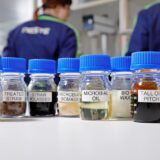Singapore’s NTU opens Southeast Asia’s first maritime energy test facility
Singapore’s Nanyang Technological University (NTU) has launched a new maritime energy test facility. The SGD 8 million (USD 5.7 million) research facility is the first of its kind in Southeast Asia.
The Maritime Energy Test Bed, which was launched on Nov. 2, will conduct research and development in areas such as alternative sources of energy, fuel additives to increase energy efficiency and technologies for cleaner emissions.
The Singapore Maritime Institute (SMI) will contribute SGD 4.7 million (USD 3.3 million) over the next 10 years to fund the facility, while NTU will provide SGD 3.4 million (USD 2.4 million), with support from other maritime leaders such as Nippon Kaiji Kyokai (ClassNK).
Projects already underway at the facility include research on a new scrubber system, which are advanced filters that curb harmful ship emissions, and development and testing of a new methanol fuel blend.
Shipping is considered the most fuel-efficient mode of freight transportation, but ships typically use low-quality fuel, especially heavy fuel oil, which emits harmful pollutants, including sulphur oxide, nitrogen oxide, carbon dioxide and other particulates.
The 1,500 square meter facility comes equipped with a 1.5 megawatt diesel ship engine, which can run on most of the conventional liquid fuel types for energy research. It will also be installed with advanced sensors and monitoring devices to facilitate research in energy storage, noise pollution and waste heat recovery.
“The fruition of the Maritime Energy Test Bed represents a successful collaboration between the research sector and the industry, and is a timely development as the maritime sector looks to green and sustainable technologies to save on costs, mitigate the effects of climate change and address growing environmental regulations,” said Andrew Tan, chief executive of the Maritime and Port Authority of Singapore.
The facility will also be an educational platform for polytechnic students, undergraduates and PhD candidates to learn and get hands-on experience. Engineers can also train there to learn skills for the green maritime industry.
“As Singapore is primarily a global trade hub, education and training are important aspects of the new Maritime Energy Test Bed at NTU,” said Lam Khin Yong, NTU chief of staff and vice-president for research. “With highly skilled manpower, Singapore will be able to attract overseas investments to the nation’s maritime industry.”








.jpg)
